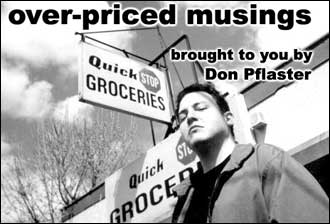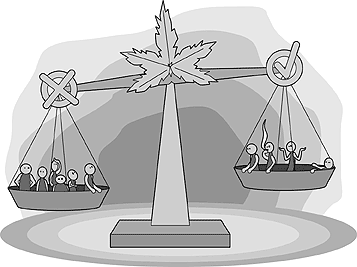Donate to IMPACT
Click below for info


• Over-Priced Musings
• Quickies
(music reviews)
 • E-Mail Comments
• Archives
• Subscribe to IMPACT
• Where to Find
IMPACT
• Buy IMPACT T-Shirts
• Ordering Back Issues
• Home
|

art/Greg Rebis
Marijuana Inches Closer
to Legalization
It sure was a wacky election.
With so much at stake, and with so many congresspersons retiring, being expelled, or dying in plane crashes, one thing you didn't notice too much on mainstream news this election was that there were pro-marijuana referendums on ballots in three states (unless you lived in those states.) I scarcely knew about it until I went to CNN.com on Election Day, and in that fine hour of web browsing, I became instantly inspired by the political process.
The states voting were Ohio, Arizona, and Nevada, and there were also municipalities across the country that voted on a smaller scale.
Ohio's measure would have reduced penalties for marijuana possession, offering treatment instead of incarceration to the offender. It was voted down by 67%. Arizona's measure would have legalized medical marijuana and also reduced the penalties for possession, punishing offenders with a civil fine. It was also voted down, but by a smaller margin of 57%.
And finally, Nevada, by far the most ambitious, had on its ballot a question that would have fully legalized personal possession of three ounces of marijuana and established a system of regulation for taxation, cultivation, and sale. Wow! Who said Nevada was a useless den of sin? This referendum clearly proved that Nevada is a vibrant, hip, and extremely useful den. Sadly, though, it didn't quite make it through, losing by 61%.
Perhaps marijuana just wasn't destined to do well in this election with such a conservative swing in American voting. But a number of other factors may have contributed to the demise of Question 9, as it was referred to in Nevada.
For instance, on the same ballot there was an ominous Question 2, which was a referendum on banning same-sex marriages. This could have motivated more conservatives to come out to the polls to vote for the ban (which ended up passing) and also contributed to their automatic vote against number 9. Couple that with the possibility that more people might have supported the marijuana question had it not been such a rush to full legalization. Perhaps voters took issue with such a broad, sweeping movement and would have preferred baby steps.

Despite the across-the-board defeat of these measures, one can't ignore that there is an extremely important political base that supports a softer stance on marijuana. The average number of people casting pro-marijuana votes was nearly 40%, which can hardly be considered fringe. I think mainstream consciousness understands that marijuana users are not a serious threat to society at large, and certainly not enough to warrant incarceration.
After all, marijuana was banned in 1937, during a time of great social experimentation and abhorrence of any substance that might make you act silly. Marijuana was a rather new blip on the people's radar, because though hemp had been growing in the Americas since 1611, the practice of smoking marijuana did not manifest greatly until the 1920's. At that time, marijuana use was highest among users of opiates, mainly immigrants, and there was a common belief that immigrants were inhumane and violent. This likely spawned the linking of marijuana to violence and the Reefer Madness mentality of the 30's. With marijuana's link to opiate users, marijuana was classified as a narcotic, and later became the victim of a huge demonization campaign spearheaded by corporate interests. Hemp was quickly becoming industrialized and hemp paper was threatening to eat into the profits of paper made from trees. Thus, the influential William Randolph Hearst, who owned paper holdings and a chain of newspapers, and Lamont DuPont, who owned chemicals for treating paper, began a nationwide smear campaign aimed at vilifying marijuana.
Prohibition since those unenlightened times has certainly not quelled use of marijuana, which is still regularly used by about 15% of all Americans.
A lot of the mentality about violent effects still persists today, and was employed by U.S. government drug czar John Walters and the DEA (Drug Enforcement Administration) to advertise against Question 9 in Nevada this fall, suggesting that marijuana leads to violence and is a date rape drug. It was kind of a lopsided fight in that state, for though the marijuana initiative was heavily funded with $2 million, it couldn't compete with the federal government's $180 million anti-drug advertising budget.
Whether or not disinformation about marijuana persists, the most important point about the drug is that too many resources are devoted to combating it, and too many people are ending up in jail. Currently, the United States has the highest per capita incarceration rate of any nation on earth, with about two million of our population in prison. 60% of those inmates are incarcerated on drug charges. Some belong there. Most don't. Five billion dollars is spent annually to imprison drug offenders, three-fourths of which have never committed a violent crime. "There is a consensus among the American public that the government's war on marijuana is misguided, ineffective and unnecessarily punitive," said Keith Stroup, executive director for the National Organization for the Reform of Marijuana Laws (NORML). "The public recognizes that adults who smoke marijuana responsibly are not criminals and they do not want to spend our nation's limited police resources arresting and jailing them."
The good news about marijuana policy reform is that the movement is growing. The recent vote in Nevada is the highest percentage ever for a measure in favor of ending prohibition. And the more people see that marijuana legalization is becoming a major cause, the more people might not think their ideas are so radical, and the more politicians won't be afraid of tackling pro-marijuana issues in the future.
The time has come to undo a hysterical and misguided 65-year-old mistake once and for all.•
Email your feedback on this article to editor@impactpress.com.
Make an IMPACT
Other Overpriced Musings by Don Pflaster:
|




